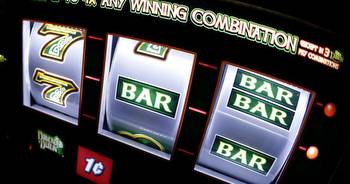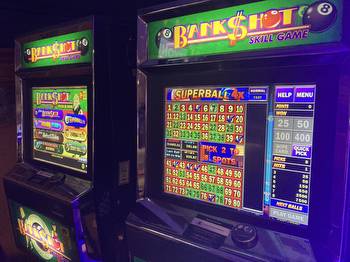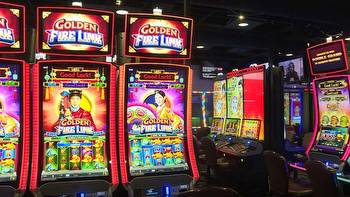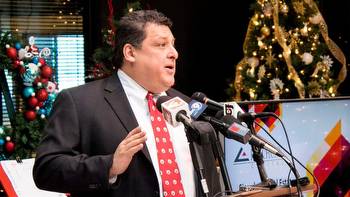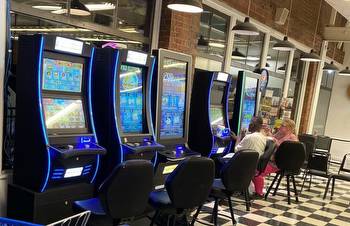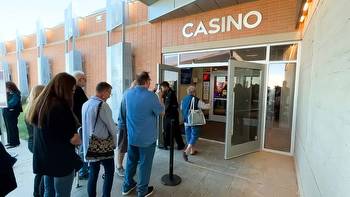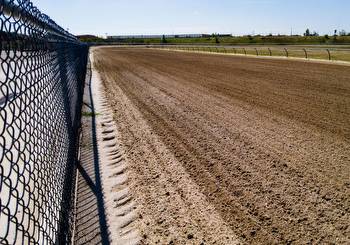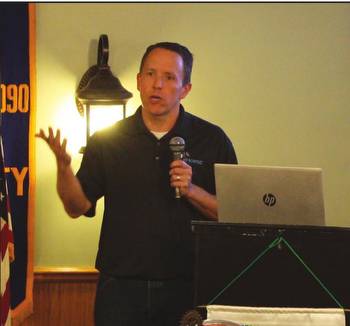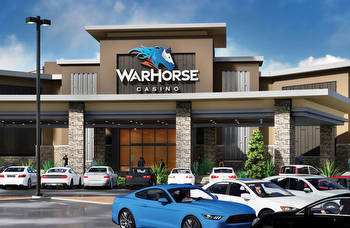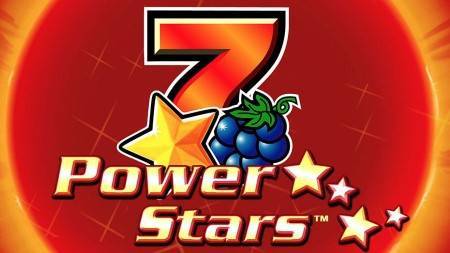Steep increase and spread of slot machine-like 'skill games' prompt concern
LINCOLN — The poster on the side of the U-Stop convenience store in south Lincoln proclaims “win big.” Just inside the business, another sign flashes “win cash.”
The messages don’t refer to the loaves of breads and six-packs of beer that fill the aisles of the store, but to three so-called “skill games” tucked in a corner.
“It’s something to do,” said 28-year-old Gregorio Seda, who, on his day off, was pushing the buttons on a video machine called “The Buffalo Game,” causing figures of buffalo, eagles and deer to tumble on the screen like a video slot machine.
Seda wasn’t winning today, but he said he once put $3 into a machine in Norfolk and, on plays costing 25 cents each, eventually lined up the characters to win $6,000.
“It’s a little rush when you win,” he said. “It’s hard to stop.”
What’s not hard now is finding one of these skill games.
State statistics indicate that 4,752 such video machines are now located in nearly 1,600 retail locations across Nebraska, from convenience stores, to grocery stores, to restaurants and bars.
Since Jan. 1, an additional 1,113 skill games have been installed across the state — a growth rate of 27%. And about 900 more skill games have obtained state permits and have yet to be installed.
The rapid expansion is drawing the concern of state legislators, people who counsel problem gamblers and operators of the state’s fledgling casino industry, who see skill games as unregulated and under-taxed competition.
“For a state that’s so anti-gambling, to have something that’s the equivalent of a slot machine everywhere, it really is astounding,” said Lance Morgan, president and CEO of Ho-Chunk Inc., which operates the 1-year-old WarHorse Casino in Lincoln.
Morgan said it galls him that a skill game machine — which is considered a game of “skill” rather than a game of “chance” like a slot machine — can be installed after obtaining a $250 state sticker. Meanwhile, it cost his organization $5 million to obtain a state casino license to allow slot machines.
“I could have just skipped the casinos and bought a bunch of gas stations,” he said. “It would have been a lot cheaper.”
On Friday, the State Legislature’s committee that oversees gambling issues will hold a public, interim hearing at 9:30 a.m. at the State Capitol.
State Sen. John Lowe of Kearney, who chairs the General Affairs Committee, said he called for a hearing this Friday after hearing complaints about the proliferation of the slot machine-type games. The hearing is scheduled for 9:30 a.m. at the State Capitol.
“I just want to find out the reasoning, why we see so many,” Lowe said. “Did we create a whole new industry here?”
In Lincoln, 769 skill games are now installed across the state’s second-largest city compared to 400 slot machines at Morgan’s casino along U.S. 77. If customers get tired of the WarHorse slot machines, they can walk across the road to a U-Stop where there’s a grouping of skill games.
Promoters of skill games say that comparing them to slot machines is like comparing an apple to an orange. Skill games, they maintain, require some level of skill to win, and some people are skilled enough to regularly win money. Slot machines, by comparison, pay out based on a random number of plays and are programmed to provide payouts every so often to reinforce additional wagers.
But when it comes to problem gambling, the head of the state’s program that offers help to compulsive gamblers says there’s no real difference.
“We’re seeing just about as many people who are in trouble with playing on those (skill) things as there are playing slot machines in a casino,” said David Geier, the director of the Nebraska Gamblers Assistance Program.
Skill games are an addictive form of gambling, and those who play then, tend to play them a lot, he said.
A growing concern in the problem gambling arena, Geier said, is that gamblers are starting at a younger and younger age. About 68% the new clients seeking help from his program started at age 18 or younger, he said.
One problem with skill games, Geier said, is that younger kids can easily play them because they are in public places, not well-monitored casinos.
“There isn’t anyone checking identification at those places,” he said, of the locations where skill games can be found.
Seda, as he punched the button on his skill game, said he’s seen younger kids play the games, though not at the Lincoln convenience store where he was playing.
Just a few feet from where he played, there was a sign saying that no one under 19 years of age is permitted in that corner of the U-Stop. Another sign promoted how to contact the problem gamblers program.
A bill to increase regulation, and taxes, on skill machines was introduced this spring by Albion Sen. Tom Briese, who recently was appointed State Treasurer, but it failed to advance.
Morgan, the casino operator, said the Legislature should at least increase regulation of the machines and shift enforcement to the State Racing and Gaming Commission.
Right now, the Nebraska Department of Revenue issues the $250 stickers that permit the skill games, much like the stickers issued for regular video games that are installed in bars and restaurants. Locations are limited in the number of skill games they can install based on their square footage.
Whether a new bill will come out of Friday’s interim hearing, as is usually the case, is unclear.
Sen. Lowe said he has “no agenda” at this point.
The original intent of such skill games, he said, was to allow American Legion clubs and other charities a way to raise money to pay rent and other expenses.
“And maybe have a few at some of the C stores,” Lowe added. “They all have them now.”








